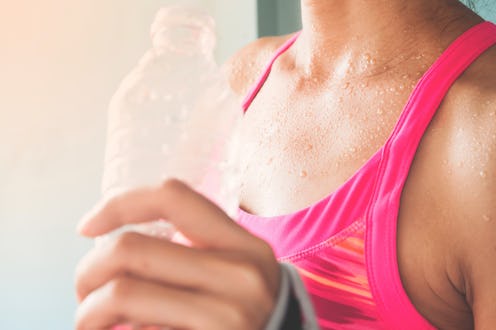Life
6 Surprising Things That Can Happen To Your Body If You Sweat A Lot

Sweating is one of the least pleasant parts of summer, especially when you know the sweet, cool air of fall is right around the corner. When you sweat, your body undergoes a complex set of reactions that can lead to your becoming dehydrated, as most people realize, or any number of unexpected things. Beyond dehydrating, though, excess sweating can lead to less obvious health consequences, from increased risk of certain infections to the potential for electric shocks and even blue sweat. Yep, you read that right.
Sweating to excess, or hyperhidrosis, is more common than you might think. A study in 2004 found that up to 2.8 percent of the population has it in some form, from sweating confined exclusively to the palms and soles of the feet to sweating, well, everywhere. It can be a side effect of some medications, menopause, infection and other issues, but it can also appear on its own, triggered by nothing in particular. And when that happens, there are certain other risks and bodily consequences that might follow — some more unexpected than others.
If you're experiencing excessive sweating it's definitely not something to keep to yourself; it's something you should consult a doctor about ASAP, to diagnose whether there's an underlying condition and figure out how to move forward. Read on to learn about other unexpected things that can happen when you sweat too much.
1Skin Infections
If you sweat a great deal, there's more moisture on your skin, and that can lead to breeding grounds for bacteria. The International Hyperhydrosis Society explains that you have excess sweating, you're at "300 percent greater risk of skin infections." The root causes, they explain, are "bacterial and fungal overgrowth," which can lead to different kinds of infections. If you notice skin cracking, redness, or abnormal texture in any area where you sweat a lot, it's a good idea to see a doctor.
2You Might Need To Avoid Certain Foods
Sweating too much can be a signal that your body is reacting in extreme ways to certain dietary stimuli. "Some individuals affected by hyperhidrosis find their condition is aggravated by certain foods and that they have to modify their diet as a result," note experts at the Virtual Medical Network. "For example, they may need to avoid alcoholic or caffeinated beverages or spicy foods."
3Your Posture May Be Affected
If you're in the habit of slouching or adjusting your body position to hide or attempt to reduce sweating, you're at risk of posture problems and back pain. It's a known consequence of sweating a lot, particularly among embarrassed teens.
4Touchscreens May Not Work For You
A study of people with hyperhidrosis in 2017 revealed that 20 percent "reported problems with using touch technologies such as computer-keyboards, computer-mouse, mobile phones and touch screens interfaces." Why? Because touchscreen technology is designed to be touched with dry skin, and water's conductivity can make things slippery or unreadable by the underlying mechanism.
5You're At Greater Risk Of Body Odor
Contrary to popular belief, sweating more does not actually increase your body odor in proportion. "Typically, people who suffer from primary hyperhidrosis do not have unusual problems with body odor," explains the International Hyperhidrosis Society. This is down to the fact that there are two types of sweat glands: the eccrine, which exudes odorless sweat and is typically the one that's affected by excess sweating, and the apocrine, which exudes fluid that mixes with bacteria to produce body odor.
"Body odor can occur, however, if a person sweats sporadically and the sweat is allowed to dry on the skin. In this circumstance, apocrine sweat would have the opportunity to react with bacteria on the skin and produce odor," says the IHS.
6Your Sweat Might Change Color
For a very small percentage of people who experience excess sweating, their sweat may appear as different colors, including yellow, blue, and green. This disorder is called chromhidrosis. It appears to be caused by special pigments produced in the sweat glands, and we know little about it; it can be stimulated by infections or liver problems, but it can also show up with no other issues at all. The sweat itself isn't harmful or poisonous, but it's definitely worth a doctor's visit.
7
Overall, excess sweating presents very little risk to your bodily health, despite these surprising changes. But it is known to be really disruptive to the lifestyle of people who experience it, so it can be helpful to talk to your doctor.